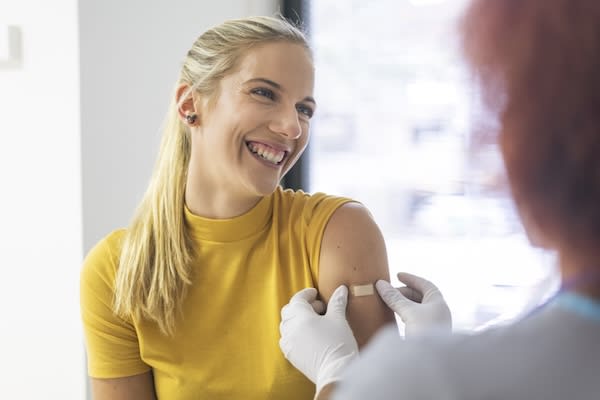Woman who hears voices shares experiences on podcast
[5 MIN READ]
In this article:
-
The Providence Institute for Human Caring’s Hear Me Now podcast features Caroline Mazel-Carlton, a woman who hears voices.
-
Mazel-Carlton has become an advocate for people with mental illnesses, speaking up to encourage them to take charge of their treatment.
-
We provide a brief recap of the podcast and topics Mazel-Carlton discussed with host Seán Collins.
Experts estimate that one in 10 people hear voices at some point in their lives, which may be a sign of mental illness. Medical providers often recommend medication for people who experience “auditory verbal hallucinations,” but Caroline Mazel-Carlton has decided to take a different approach — living with her voices as a part of her life. Mazel-Carlton is the director of training for the Wildflower Alliance, a grassroots peer support, advocacy and training organization that helps people who have experienced traumatic life events and diagnoses. Seán Collins, host of the Hear Me Now Podcast for the Providence Institute for Human Caring, recently spoke with Mazel-Carlton about her voices, her experiences and her mission to help others living with mental illness.
Trauma at the origin
Mazel-Carlton first began experiencing voices when she was 5 years old and staying at a home day care center where the owner was abusive. The woman was talking to a friend, and a voice over Mazel-Carlton’s shoulder (whom she now identifies as “Frank”) started commenting on what the woman was saying, calling her a liar. “Rates of voice hearing are quite high in children, much higher than one in 10,” Mazel-Carlton said. “For a lot of kids, it doesn't follow them into adulthood. But if it does, the voices come as a sign that something's not quite right, and it needs to change.”
By the time Mazel-Carlton was a teenager, she was hearing more voices. Often, the voices would be responding to unpleasant aspects of her life, such as the bullying she experienced in school. Frank has been the most constant voice in her life, and while he is protective of her, he can also be loud and aggressive. He often encourages her to carry a knife to protect herself from people he believes are going to hurt her. Once, he even told her to punch someone in the face. “My job is really looking at the message beneath his fear and concern and having the space to evaluate it, which now I really do,” she said.
Directly engaging with voices
Daily, Mazel-Carlton has to live with the sometimes-alarming things the voices say to her. In particular, some of the voices have encouraged her to harm herself, either by speaking to her directly or by talking about her to each other.
Her employer, Wildflower Alliance, sponsors “alternatives to suicide” groups that bring together people who have considered suicide. “We have this practice of talking about the thoughts, feelings, and conditions that are connected to that,” she said. “When you do that, you start to develop a support network where you’re learning from other people that have navigated these tough times, and you’re learning more about yourself. So, for example, with Frank, I know that if I don’t take time to listen to him or my other voices at least a couple times a day, things can get really extreme.”
So, she lets Frank have his say, and she acknowledges his opinion about events in her life. And, most importantly, she takes a critical look at her own life to see what’s happening that might have triggered his response. For example, the last time Frank told her others were trying to kill her, she was dealing with a tough situation at work and didn’t feel like she had support. It turned out there were people who were willing to help, but she just had to ask for it. Frank’s response was her body’s way of warning her something wasn’t right.
“But if you really talk to people like myself that have felt suicidal, you’ll find that suicide isn’t actually their problem,” she said. “Suicide is their solution for a whole host of trauma. And so, if we’re just focusing on eliminating suicide, we’re never actually getting to the real problems and the real feelings that people need to express and be validated for. So, having alternatives to suicide is an approach that helps create those spaces where we’re not immediately jumping to contain someone.”
Directly engaging with voices
Mazel-Carlton strives to support others with mental illnesses by slowing down and listening to them, and she encourages others to listen, as well. “Sometimes people underestimate their capacity to be a healer,” she said. “They think, ‘Oh, I need to have a Ph.D., or I need to have this particular clinical training to help someone. But they don’t.”
Tune in and listen to the Hearing Voices podcast.
Find a doctor
If you are looking for a mental health provider, you can search for one who’s right for you in our provider directory.
Download the Providence App
We’re with you, wherever you are. Make Providence’s app your personalized connection to your health. Schedule appointments, conduct virtual visits, message your doctor, view your health records, and more. Learn more and download the app.
Related resources
Teens shine spotlight on mental health awareness
Don’t be afraid to seek mental health care
This information is not intended as a substitute for professional medical care. Always follow your health care professional's instructions.



